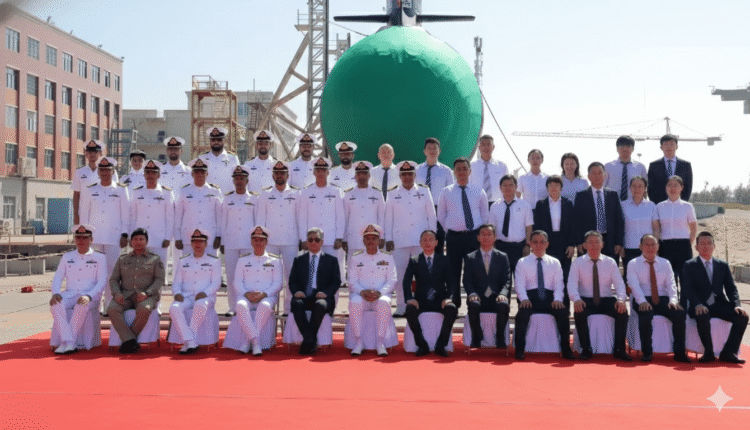
Pakistan plans to deploy its first Chinese submarine in 2026.
Pakistan Navy's new Chinese submarines and frigates boost maritime security and regional cooperation.
Pakistan Navy – (Special Correspondent / Web Desk) – Admiral Naveed Ashraf, Chief of Naval Staff, told Chinese official media that the Pakistan Navy expects its first Chinese-designed submarine to join active service next year.
A deal under which Islamabad will receive eight Hangor-class submarines by 2028 is “progressing smoothly,” Admiral Ashraf told the Global Times in an interview published on Sunday, adding that the successful launch of the second and third submarines in China earlier this year was a significant milestone in the two countries’ naval collaboration.
According to the report, Admiral Ashraf stated that the project would not only advance the Pakistan Navy’s submarine force capabilities, but would also contribute to self-reliance through technology transfer and skill development at the Karachi Shipyard and Engineering Works.
He said that the Type 054A/P frigates marked another major achievement in China-Pakistan naval cooperation. The publication reported that such multirole frigates were already in service with the Pakistan Navy, quoting Admiral Ashraf as saying that they are “among the most advanced surface combatants”.
Pakistan and Afghanistan agree to a fragile week-long ceasefire.
Admiral Ashraf also told the Global Times that these Chinese-made frigates had greatly strengthened the navy’s multi-mission capability, particularly in air defence, anti-submarine warfare and maritime surveillance.
“These platforms are playing a key role in ensuring maritime security in the North Arabian Sea and the broader Indian Ocean region, which is critical for global economy,” he was quoted as saying.
The update on the Chinese submarine deal follows the Pakistan Air Force using Chinese-made J-10 fighter jets in May to shoot down an Indian Air Force Rafale aircraft, made by France.
The altercation between the nuclear-armed neighbours surprised many in the military community and raised questions over the superiority of Western hardware over Chinese alternatives.
Under the terms of the submarine agreement — reportedly worth up to $5 billion — the first four diesel-electric attack submarines will be built in China, with the remaining vessels assembled in Pakistan to improve the nation’s technical capabilities.
Gold Rates in Pakistan Today – 3 November 2025
Pakistan has already launched three of the submarines into China’s Yangtze River from a shipyard in the central province of Hubei.
“Chinese-origin platforms and equipment have been reliable, technologically advanced and well-suited to Pakistan Navy’s operational requirements,” Admiral Ashraf told the Global Times, adding that the navy’s experience with them had been positive, both in terms of performance and technical support.
“As modern warfare progresses, emerging technologies such as unmanned systems, artificial intelligence, and advanced electronic warfare systems will become more significant. “The Pakistan Navy is focusing on these technologies and considering collaboration with China,” Ashraf was reported saying.
Islamabad has long been Beijing’s main arms customer, purchasing more than 60% of China’s weapons exports between 2020 and 2024, according to data from the Stockholm International Peace Research Institute.
Admiral Ashraf stated that the Pakistan Navy’s alliance with China is based on profound friendship, mutual respect, trust, and shared strategic interests.
“In the coming decade, we expect this relationship to grow, encompassing not only shipbuilding and training, but also enhanced interoperability, research, technology sharing and industrial collaboration,“ he was quoted as saying.
“There is immense potential for cooperation in advanced technologies, unmanned systems, marine scientific research and maritime industry development. Together, we aim to ensure a secure and stable maritime environment that supports regional peace and prosperity,” he further said, adding that China has been a “trusted partner in the Pakistan Navy’s modernisation journey”.
onus is on Kabul to act against terrorists who use Afghan land to target Pakistan.
He further said that the introduction of advanced frigates and submarines had significantly enhanced the Pakistan Navy’s operational reach, multi-domain war fighting capabilities, and deterrence posture, the publication reported.
He said that these platforms, along with joint training and exercises with China, had deepened the two sides’ professional synergy and strengthened interoperability at sea, noting that “this cooperation goes beyond hardware; it reflects a shared strategic outlook, mutual trust, and a long-standing partnership”.






Comments are closed, but trackbacks and pingbacks are open.